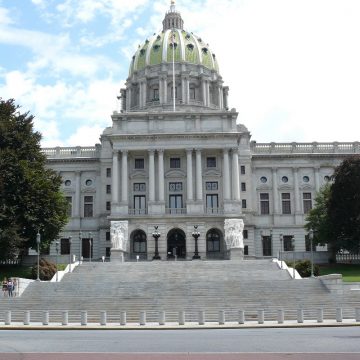
The Pennsylvania House of Representatives passed an expansive gambling bill on Wednesday. The bill includes online gambling, video lottery terminals in airports and pubs, and an expansion of lottery gambling.
The bill is a whopping 675 pages long, which caused some opponents to complain that no one had time to read the bill’s contents. State Rep. Madeleine Dean, a Democrat from Montgomery County, said, on the House floor, “If you all had the chance to read it, I don’t know how you did it.”
House Majority Leader Dave Reed, a Republican from Indiana County, said that lawmakers did not have to read the entire proposal, because it repeated much of the language of a Senate bill passed last month. Majority Leader Reed praised the legislation as an improvement, stating, “This is building upon the Senate proposal and will actually enhance revenue a little further.”
The bill, which includes provisions for online poker and casino gaming, passed by a 102-89 vote. The House vote was considered a major hurdle by gaming analysts, though it is unknown if the Pennsylvania House and Senate can agree on the full set of gaming laws.
Senate Bill Passed in May
The Pennsylvania Senate passed a more conservative gambling bill in May 2017, but the two legislative bodies have to agree on similar language before their proposed legislation would be sent to the Pennsyvlania governor.
It also is uncertain whether Governor Tom Wolf will sign such the gambling bill in its current form, though the Democrat governor said on one occasion that he would sign an online gambling bill. In 2016, Gov. Wolf’s state treasury added online gambling to its budget, so the adminstration appears to have accepted the idea of online gambling.
Up to 40,000 Video Lottery Terminals
One major potential problem with the House bill is a measure which would approve between 35,000 and 40,000 new video lottery terminals (VLTs) in the state. Those VLTs would be approved for taverns, bars, and clubs across the state. While the provision would help small businesses remain profitable, such a vast expansion of gaming machines would undercut brick-and-mortar casino revenues, as well as racino gaming.
For that reason, the casino industry is going to lobby against the House measure. Sheldon Adelson is funding a political action group, Pennsylvnanians For Responsible Government, which launched a $1 million attack ad campaign to oppose the House’s gambling bill.
Land of 12,000 Casinos
The advertisements for PFRG calls Pennsylvania “The Land of 12,000 Casinos”, then claims the legislation would put video lottery terminals in “delis and nursing homes”. Proponents of the bill — including State Representative John Cunnane, State Senator Lisa Boscola, and Tom Boock of the Pennsylvania Tavern Association — say that the group’s attack ads skew the facts and misrepresent the bill’s reach.
Michael Barley of Pennsylvanians For Responsible Government, on the other hand, says that the bill would more than double the number of gaming machines in the state. At present, says Mr. Barley, Pennsylvania casinos and racinos have about 27,000 combined slot machines and video poker machines. Barley claims the bill would hurt the state’s casino industry.
Fourth State to Legalize Online Poker?
If the Pennsylvania House, Senate, and governor could get on the same page, though, Pennsylvania would become the fourth state to legalize, regulate, license, and tax online casinos and poker. The bill could be a game changer for the online poker industry in the United States.
Pennsylvania’s online poker regulators might sign on to the interstate poker compact which exists between Nevada and Delaware. As one of the big US states, Pennsylvania’s pool of players (over 12 million strong) would boost player liquidity by several factors. That, in turn, might convince New Jersey to sign on to the same compact, because the combined player pool would be nearly twice the size of New Jersey’s one-state poker community.
If the four states joined together, they would have a player pool of over 25 million people — larger than Australia’s entire population. Such a large player liquidity pool might attract other large states to legalize online poker, because it would be much more lucrative than what currenly awaits such a state. California, New York, and Illinois all have considered such a bill in the past few years.
What Online Poker in Pennsylvania Would Mean
In short, the decision to pass an online gambling bill by Pennsylvania’s House of Representatives on Wednesday could be the start of something big in the American poker community. Several major obstacles still remain — and the land-based provisions could very well cause the failure of the online provisions — but Wednesday’s vote is a sign of progress.
Those still concerned about Sheldon Adelson’s congressional allies passing some version of Restore America’s Wire Act should take heart from a Pennsylvania online gambling bill, too. The more states which have regulated online gambling, the less likely the U.S. Congress will pass a bill to ban online gambling. More states mean more representatives on Capitol Hill with a stake in preserving regulated online gambling.















